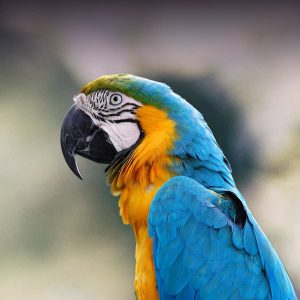Blue Gold Macaw Parrot: The Majestic Jewel of the Rainforest
The Blue Gold Macaw, also known as the Blue and Gold Macaw (scientifically named Ara ararauna), is one of the most iconic and stunning parrot species in the world. With their vibrant blue and yellow feathers, sharp personalities, and remarkable intelligence, they have captivated bird enthusiasts, wildlife admirers, and pet owners alike.
In this blog, we’ll explore the Blue Gold Macaw’s natural history, care requirements, and why they continue to be a symbol of beauty and wisdom in both the wild and as pets.
1. The Appearance of the Blue Gold Macaw
The Blue Gold Macaw is easily recognizable by its striking plumage. Their feathers are a brilliant mix of blue on the back and wings, while the undersides and chest are a radiant yellow. The face is marked by a white, featherless patch around the eyes, which contrasts with the bright colors of the feathers, giving them a unique, expressive look. Their long tails add to their elegance, and their overall size — up to 33 inches (85 cm) in length — makes them one of the larger macaw species.
2. Native Habitat and Range
Blue Gold Macaws are native to the rainforests of Central and South America. They are found in countries such as Brazil, Bolivia, Ecuador, Colombia, and Venezuela. They prefer tropical habitats near rivers, where they nest in the tall trees and forage for food. Due to deforestation and habitat destruction, the Blue Gold Macaw’s population has seen a decline in the wild, though they are still relatively abundant compared to some other macaw species.
3. Diet and Feeding Habits
These parrots are omnivorous and have a varied diet in the wild, which includes fruits, nuts, seeds, flowers, and sometimes small insects. Their powerful beaks are well-suited for cracking open hard nuts, which are an essential part of their diet. In captivity, Blue Gold Macaws require a balanced diet of high-quality pellets, fresh fruits and vegetables, and occasional nuts. It’s important to provide them with a diverse array of foods to ensure they receive all the nutrients they need for optimal health.
4. Intelligence and Social Behavior
Blue Gold Macaws are incredibly intelligent, capable of learning a wide variety of behaviors and tricks. They can mimic human speech and often form strong bonds with their human companions. In the wild, they are social birds that live in large flocks, where they communicate with each other using a variety of vocalizations.
Their intelligence and social nature make them excellent pets for experienced bird owners who can dedicate time and attention to their needs. However, they also require a lot of mental stimulation and social interaction. A Blue Gold Macaw that doesn’t receive enough attention can become bored, leading to behavioral issues such as feather plucking or excessive screaming.
5. Care and Keeping as Pets
Blue Gold Macaws are a long-term commitment, with lifespans that can extend 50 years or more in captivity. They are not a pet for everyone. These birds require a large cage, as they are highly active and need room to stretch their wings and climb. They also need daily out-of-cage time to interact with their human family members.
Their diet must be carefully monitored, as macaws are prone to obesity if they overeat certain foods. Regular health checkups with an avian vet are essential to ensure they remain in good condition.
In addition to their physical needs, mental stimulation is crucial. Providing them with a variety of toys, puzzles, and activities can help keep their sharp minds engaged. Interactive playtime and positive reinforcement training can also strengthen the bond between you and your macaw while providing them with the mental challenges they crave.
6. Breeding and Conservation
In the wild, Blue Gold Macaws typically breed during the dry season. They build their nests in tall trees, often in the cavities or hollows of ancient trees. Both parents are involved in the care of the young, which take about 90 days to fledge. However, due to deforestation and illegal trapping for the pet trade, the Blue Gold Macaw’s population in the wild has been threatened.
Though their status in the wild is of concern, many conservation efforts are underway to protect these magnificent birds. In captivity, breeding programs help maintain healthy populations and reduce the demand for birds taken from the wild.
7. The Joy of Owning a Blue Gold Macaw
While Blue Gold Macaws are often considered high-maintenance pets due to their social needs and size, they can be incredibly rewarding companions for the right owners. Their affectionate nature, playful demeanor, and impressive communication skills make them a delight to live with, especially when their needs are met. They form deep bonds with their caregivers, often seeking attention, cuddles, and even “talking” to them in a wide variety of sounds.
However, it is important to remember that owning a Blue Gold Macaw is not a decision to be taken lightly. These birds require substantial time, space, and attention. They also need to be kept in a safe and enriching environment to thrive. Prospective owners should research thoroughly and ensure they can meet the bird’s physical, social, and emotional needs before making a commitment.
Conclusion
The Blue Gold Macaw is more than just a pet; it’s a living work of art, a companion, and a reminder of the beauty and complexity of our natural world. Whether in the wild or as a pet, these parrots inspire awe with their beauty, intelligence, and personality. If you’re considering welcoming one into your life, be prepared for a rewarding experience, but also for the responsibility of caring for one of the most remarkable creatures on Earth.
So, if you’re ready for the commitment and can offer the care and love that a Blue Gold Macaw needs, you’ll find that these incredible parrots will become a lifelong friend, brightening your life with their stunning colors, charming antics, and soulful calls.
Are you considering a Blue Gold Macaw as a pet? Or perhaps you’re fascinated by their role in the wild? Feel free to share your thoughts in the comments below!



